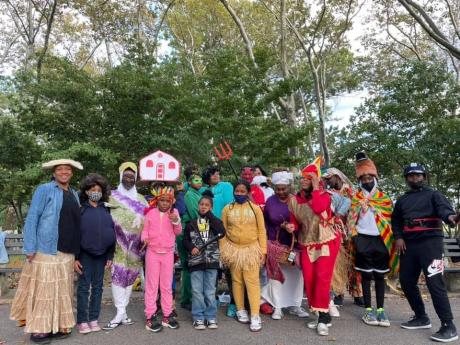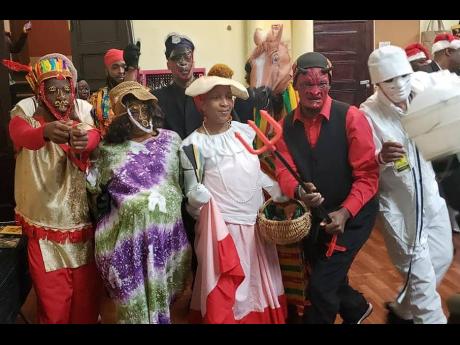Jonkonnu is not dead – Part II
The news is that Jonkonnu is not dead, though it might not be seen in its festiveness all over the place at Christmastime. It is certainly alive, on life support. Not only are memories of it permanently etched in people’s minds, it is also immortalised in various types of art.
And there are those who are propping up its head, holding its hands, and bracing it legs, making sure the lines on the monitor do not go flat. One such person is Sophia Walsh-Newman, a performing and teaching artist who was born in London, England, and brought up in the United Kingdom, Jamaica and the United States of America.
“As a child of the Windrush generation, I had only experienced Jonkonnu a few times at Linstead Grand Market during Christmas, which I really enjoyed. As a lover of all things African, I was fascinated with the Africanness of the costumes and dancing, which was similar to what I have seen on the continent,” Walsh-Newman told The Gleaner.
From that wide-eyed child looking on from the sidelines, she has evolved into one of the biggest exponents of Jonkonnu. Her experience with performing Jonkonnu began in New York many years ago with Braata Productions for a Grand Market event. She learned a choreographed parade in which she played the ‘Indian’ character. She was subsequently tasked to coordinate Jonkonnu performances for Braata Productions.
“That led to also being asked to teach a Jonkonnu class and therefore, to do the necessary research into the history of Jonkonnu … . Learning more about the characters was a great story of making fun at the plantation colonialists, which helped me to begin to choreograph and create my own costumes for the Asoso International Ensemble’s requests for Jonkonnu,” Walsh-Newman explained.
“I also felt it was very important, and necessary, to be able to bring this authentic folk form from Jamaica to those in the diaspora who may be familiar with it, as well as to their offspring who may not have otherwise had the opportunity to see something so deeply Jamaican.”
It is indeed a part of our cultural heritage, but cultural sensibilities have changed. There is a general lack of interest in traditional art forms for mainstream entertainment purposes, and the moribund state that Jonkonuu seems to be in can be attributed to many factors.
One of them is the negative attitude of many Jamaicans towards anything that reminds them of our slavery past and our racial link to Africa. They are not enchanted by the aesthetics and styles of traditional folk forms such as Jonkonnu. The masquerade of Jonkonnu, etc, has been replaced by the masquerade of dancehall, in which patrons who have bleached their skin are competing for the video light. They dare not hide their ‘chrome’ complexion behind the masks of Jonkonnu.
“As a recent returnee, it is disturbing to see more Jamaicans bleaching and moving away from acknowledging their direct connections to Africa,” Walsh-Newman shared. “As that child of Windrush who only occasionally had the chance to experience the African folk retentions of Jamaica, I love being able to help in the sharing and retention of some of Jamaica’s rich African traditions, and look forward to when we can do another Jamaican African Dance Arts and Culture (JADAC) Festival, where we highlight the richness of Africa found in Jamaica.” Since 2016, the JADAC Festival has been held in February in St Ann, but was shelved this year because of COVID-19 issues.
Walsh-Newman is one of the coordinators of the festival, where she holds African dance workshops. She also teaches Djembe drumming, yoga, arts and crafts, “and much more,” including Jonkonnu, for four years going.


